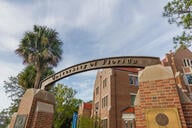You have /5 articles left.
Sign up for a free account or log in.
The ad in Thursday's The New York Times couldn't have been more ominous. Beneath a large swastika, the text says: "Now Appearing at a Campus Near You."
It goes on to say "The sentiment behind the heinous symbol is alive and well and growing on American college campuses.... Students are being attacked verbally and physically simply because they're Jewish."
The ad goes on to urge people to sign a petition against anti-Semitism and to donate to support the campaign, at its Web site, Campus Truth.
On the Web site, you'll find the swastika again, some summaries of anti-Semitic incidents, the petition to sign, numerous links to Web sites that are staunchly pro-Israel or critical of Palestinian leaders -- and very little information about Campus Truth.
Calls and e-mail messages to the founder of the organization were not returned Thursday. But the group has been controversial on numerous campuses in recent years through advertising in student newspapers about the Israeli-Palestinian conflict. The Times ad, which appears to be a shift for the group toward a more national focus, doesn't mention Israel or the Palestinians.
The ad comes amid a debate over allegations that scholars at Columbia University's Middle Eastern studies program have intimidated Jewish and Israeli students. Columbia is investigating these charges, facing alumni criticism that it ignored the treatment of some students, and also facing faculty criticism that professors are being subjected to extra scrutiny just because of their criticism of Israel.
Some experts on Jewish life on campuses and some university officials paint a different picture from the one portrayed in the ad and on the Web site.
Jeff Rubin, director of communications for Hillel nationally, said, "Of course we are worried whenever there is an anti-Semitic incident on a campus, but for every anti-Semitic incident, there are 200 or more positive educational programs that are taking place to strengthen Jewish campus life."
He said that while statistics suggest "a slight increase" in the number of anti-Semitic incidents on campus, "it is really marginal." Rubin stressed that he would never "minimize the impact [anti-Semitism] has when it erupts."
Sheldon E. Steinbach, vice president and general counsel of the American Council on Education, said, "The assertions made by these groups [about a rise in anti-Semitism] relate to incidental, infrequent and isolated and unrelated incidents on maybe a dozen or more campuses, over the course of the last five years."
He said that in the Internet age, information and exaggerated information can spread quickly. He said he has personally looked into some of the allegations of incidents that have circulated online and found them to be "significantly overblown."
Any allegation of this sort should be investigated, he said, "but the isolated incidents -- and they are isolated and unique -- need to be judged on their merits, and it hardly seems to constitute a rampant wave of anti-Semitism."
Campus officials also questioned some of the information on the Web site. For example, one of the examples given on the Campus Truth Web site concerns the University of Michigan at Ann Arbor, where the Web site says that a Jewish student was assaulted with a soda bottle thrown from a car, while the perpetrator shouted slurs against the student.
Julie Peterson, a spokeswoman for Michigan, said that the incident took place two years ago, that the assailants were high school students, and that it took place off the campus. Police officers filed charges against the assailants, who were convicted.
"It's unfortunate that the Campus Truth Web site does not provide appropriate context, including when the incident occured and what the outcome was," Peterson said. "Like any large community, the University of Michigan has its share of hate incidents, but fortunately those incidents targeting Jewish students are relatively rare."
In fact, Michigan's Jewish community has of late been celebrating a $20 million gift that will create a major new research center on Jewish studies.
Another Michigan institution named on the Web site is Wayne State University, where Campus Truth says that a Jewish student was told, "You better watch your back because I'll be looking for you and when I find you, I will kill you, you dirty Jew."
Miriam Starkman, executive director of Hillel at Wayne State, said she had never heard of this incident. She said that she has heard of "similar occurrences that happen on occasion." But she said that whenever something has happened, she has worked with the administration, which she said has been "very helpful in making sure our students feel safe on campus."
Prior to yesterday, Campus Truth primarily received attention for its ads in college newspapers. Student newspapers that have run its ads have faced a barrage of criticism over their content, with many Arab students saying that the ads encourage Americans to think of all Palestinians as terrorists. The ads have typically prompted sparring in the papers' letters columns, as was the case at Yale University and the University of Arizona.
CampusJ, a Web site focused on Jewish college students, posted information on its Web site yesterday about Campus Truth, noting that it is part of the One Truth Foundation, a nonprofit organization whose tax forms state that its mission is "to increase awareness of issues relating to the Middle East at colleges in the United States."
Marcella Rosen, the head of the foundation, did not return calls Thursday. In an interview with The Palo Alto Weekly in 2003, following a controversy at Stanford University over her ads, she said she started the ad campaign after coming to believe that most college students don't understand what is happening in the Middle East.
She said that students who called the ads racist or offensive were just "fussing" or being "ridiculous."




